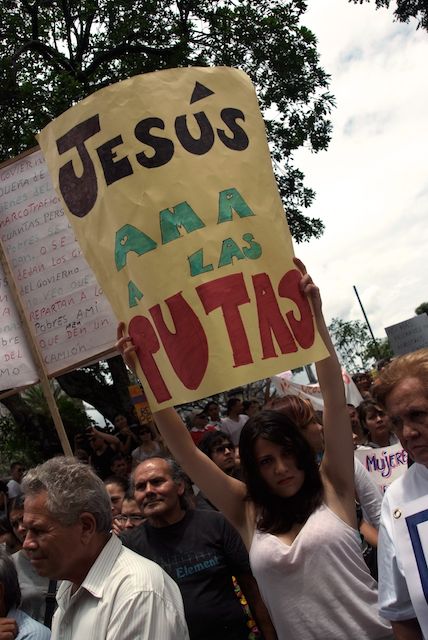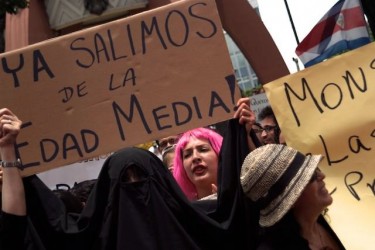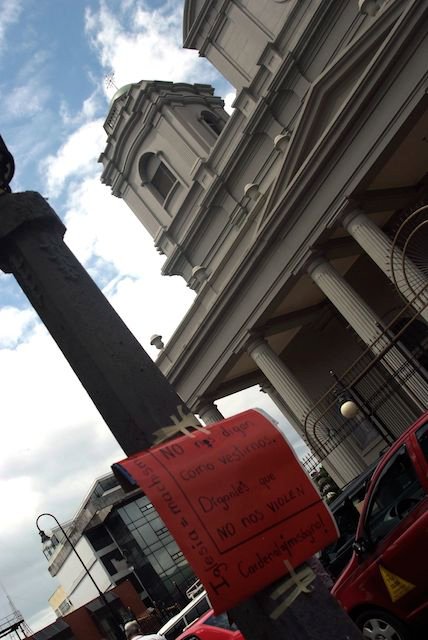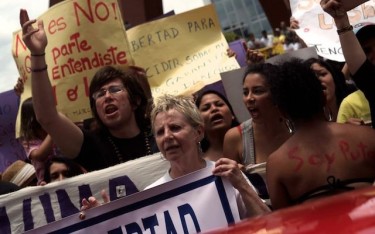This post is part of our special coverage SlutWalks 2011 [1].
Last Sunday 14 August, 2011, the Costa Rican Slut Walk took place in the capital city of San Jose causing both a media and religious backlash due to allegedly violent anti-church chants and performances. The ongoing debate has been covered on both citizen and mass media outlets as people react to the Costa Rican version of this worldwide protest.
Although reactions to the Slut Walk have been varied, it seems that its real success was in getting people to think about gender violence, religion and respect.
Last week Global Voices posted an update [3] on the reasons behind the walk:
The walk comes as a response to the statements made by a Catholic Bishop and visiting Cardinal during Costa Rica's Patron Saint ceremony on August 2nd, where they asked women to dress modestly to avoid being dehumanized or objectified, to refrain from doing manly tasks and to keep to their house and home.
According to Pablex [4], a journalist and blogger who took the time to read through the whole speech the Bishop Ulloa gave on August 2, he never mentioned the phrase that the national newspaper La Nación attributed to him and which caused the outrage that spurred the walk:
Ulloa no es ningún gurú y está lejísimos de ser el clérigo más inteligente del catolicismo tico. Pero en honor a la verdad, de su homilía (hacer clic para leerla completa) [5] en ningún lado se desprende la frase tan publicada por La Nación [6], pidiendo recato a las mujeres para vestir, algo que en Twitter se podría “taguear” como #peladadelamarchadelasputas.
Pablex goes on to suggest that the possible strength behind the Slut Walk movement was lost due to the women focusing on such a small detail on the face of all the injustices women in Costa Rica face and that it was counterproductive to focus their anger on the church in such a disrespectful way:
Aún si Ulloa hubiese dicho que las mujeres costarricenses “deben vestir con recato”, eso no hubiera justificado jamás los insultos, las burlas, las malacrianzas y la falta de respeto que ese grupo de fanáticos y alborotadores tuvieron esa mañana de domingo frente a la Catedral Metropolitana. La tolerancia que tanto reclaman de la Iglesia les quedó corta, muy corta, tanto o más como sus enaguas putescas.
Rashida Jenny Torres wrote about her perspective as a Muslim in Costa Rica [8] regarding the Slut Walk, and although she isn't of the same faith than the criticized Catholic church, she believes that the walk also showed a lack of respect to Muslim women as herself: some women taking part of the march wore Islamic veils as a synonym of the oppression women face. For Rashida Jenny the walk became an ineffectual simplification of such a complex issue as women's rights.
Yo, como mujer, madre, trabajadora y musulmana portadora del velo por decisión propia, sintiéndome siempre orgullosa de cómo me veo, de lo que soy y represento, siento que este tipo de manifestaciones no representa de forma alguna los derechos de las mujeres o de cualquier ser indefenso a no ser abusado tanto física como sexualmente.
A mí me han faltado el respeto cubierta por completo y en un país como este que no es islámico y en donde todos pueden vestir como quieren.
He sorprendido a varones cuando voy en el autobús hacia el trabajo, tratando de levantar mi falda disimuladamente para tratar de ver por lo menos mi tobillo.
I, as a woman, mother, worker and Muslim who wears the veil by my own choice, feeling always proud of how I look, of what I am and what I represent, feel that this type of manifestations don't represent in any way the rights of women or of any defenseless being to be kept safe from physical as well as sexual abuse.
I've been disrespected even when completely covered and in a country like this one which isn't Islamic and where everyone can dress as they please.
While on the bus on my way to work I've caught men sneakily trying to lift up my skirt to see if they can catch at least a glimpse of my ankle.
Andrea Aguilar Calderón [9] also wrote about the walk, and why she decided not to participate in the slut walk even though she considers herself a slut. In her post “I'm a slut but I didn't walk” [10] she writes about how she would've marched proudly as a slut if the focus had been anger at any of the other dozens of institutions oppressing women, and not necessarily only the easier target of the Catholic Church:
Pero, al mismo tiempo, me parece que quienes nos hacen la vida de cuadritos a las mujeres, hoy por hoy, no son los curas.
Los evangelios que nos rigen hoy son distintos, no se encuentran en la Biblia. Se encuentran en la televisión, donde las mujeres claro que van a clases, porque tienen derecho a educarse, pero usando una faldita a cuadros y dos colitas al mejor estilo RBD. O, mejor aun: se encuentran en cualquier colegio del país, donde se puede ver a docenas de niñas usando esos pantalones tan ajustados que parece que se los untan cada mañana antes de salir, listas para jugar, desde la tierna edad de trece años, a ser “ricas” porque ese es el objetivo primordial de cualquier mujer en la vida. No es la enorme y abrumadora mayoría la que presta atención al sermón del padre desde el púlpito, pero sí lo es la que mira fijamente a las chicas Pilsen bailar desde la barra y que convierte a cualquier hija de vecina de brassier inflado en “modelo”. No es el infierno lo que espanta al vulgo, si no el rechazo social, el ser la gorda, la solterona, la güeisa que no ha tenido sexo en un mes.
But at the same time, I feel like those who make women's lives impossible, at this day and age, aren't priests.
The gospels which reign over us are different and not found in the Bible. They are found in the television, where women of course go to school, because they have a right to get educated, but they go wearing short plaid skirt and pigtails in RDB [Note.- Mexican soap opera for youth]. Or better yet: they are found in any of the high schools in our country, where you can see dozens of girls wearing pants so tight they seem painted on every morning before heading out, ready to play at the tender age of thirteen the game of being “hot” because that is the prime objective of any woman in this life. It isn't the enormous and overwhelming majority who is paying attention to the priests sermon from the altar, but they are keeping their eyes glued on the Pilsen girls dancing on the bar counters and which make any girl next door with a blown up brassiere into a “model”. It isn't hell which scares the populace, but social rejection: being the fat one, the spinster, the hag who hasn't had sex in a month.
The Catholic Church's Ecumenical Council has declared that the Slut Walk violated the Rule of Law [12] since it incited hate and violence against a specific religion. The Costa Rican Slut Walk's organizers have sent out a press release available on Facebook [13] where they clarify that in no moment did they incite violence and that as a widely publicized activity which spread through different social networks it attracted a diversity of people with different perspectives and probably one of the only points in common was outrage at the systemic mistreatment of women by Costa Rican society.
In their statement they quote Julia Ardón [14], who was at the march and whose photographs taken at the SlutWalk are illustrating this post (with her permission):
Cosas distintas que se vieron en la Marcha de las Putas en San José, a diferencia de las de otros países:
1-A la par del llamado al respeto y la dignidad de todas las mujeres, hubo un reclamo por la violencia de parte de la Iglesia Católica que insiste en gobernar el cuerpo femenino, y el vehemente llamado al Estado Laico ya.
2-Lo más interesante: la marcha, convocada por grupos feministas, contó con la participación de gente de todas las edades, y además; más o menos un 50% de hombres, lo que la convirtió en una Marcha bastante especial.
Muy sobrio todo, muy alegre, muy bonito y sobre todo: muy lleno de respeto y coraje. Fui muy feliz de ser parte y de encontrarme allí a tantos amigos y amigas. Hoy me sentí orgullosa de pertenecer a esta comunidad costarricense. Acá hay cosas lindas naciendo. Siento mucha esperanza
1. Hand in hand with the call for respect and dignity towards all women, there was a complaint on the violence the Catholic Church uses when insisting on governing the female body, and a loud call towards a Secular State now.
2. The most interesting part: the walk, organized by feminist groups, had the participation of people of all ages and besides; around 50% were male, which made it quite a special Walk.
It was sober, happy, pretty but above all: full of respect and courage. I was very happy to have been a part of it and to find so many friends there. Today I felt proud to belong to this Costa Rican community. There are pretty things being born. I feel hopeful.
Blogger Bryan Gonzalez [16] also wrote about his support to the Slut Walk and to the artistic performances showing partial nudity and lewd acts representing the Catholic Church:
Respecto al performance [17] que se realizó en la marcha, pues mi aplauso a la actriz y al actor, fueron quienes mejor representaron la violencia del machismo católico. La iglesia se indigna y afirma que dicha actuación atenta contra la moral pública (de un pueblo mojigato). Pero nada más indignante y una verdadera afrenta a la moral pública que la jerarquía de la iglesia católica encubra a acosadores y violadores. ¿Por qué no se pronuncia al respecto la conferencia episcopal? ¿Por qué si se habla de procesos judiciales contra 2 artistas y no contra pedófilos y quienes les encubren? ¿Y los actos de corrupción financiera perpetrados por la conferencia episcopal no atentan contra la moral pública?
The reactions to the mentioned “performance” can be read in the 105 comments which quickly escalated to a flame war under a Facebook picture of the actress [17], where she's laying with her chest covered in words and chains while biting a rosary, with a disembodied fist held between her naked thighs. While some defended the expression as performance art, others considered that she was just denigrating herself and offending the church while at it.
The Suicidal Bunnies [18] blog also commented on the Slut Walk, where Amorexia writes that although there were many chants that he didn't share, he believes that in general the activity was wonderful, a valid complaint which was restorative more than necessary. He also shares a video of the Slut Walk in Costa Rica [19], where the chant “No is no, I said no. Which part didn't you understand, the N or the O?” can be heard at the beginning of the video as participants stand in front of the Metropolitan Cathedral:
Although reactions to the Slut Walk have been varied, some positive and some negative, it seems that its real success was in getting people to think about and express their thoughts regarding the meaning and forms of gender violence, rape and respect.
All images used on this post belong to Julia Ardón [20], Costa Rican photographer and blogger and are used with her permission.
This post is part of our special coverage SlutWalks 2011 [1].



